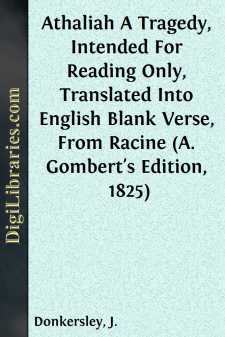Categories
- Antiques & Collectibles 13
- Architecture 36
- Art 48
- Bibles 22
- Biography & Autobiography 813
- Body, Mind & Spirit 142
- Business & Economics 28
- Children's Books 15
- Children's Fiction 12
- Computers 4
- Cooking 94
- Crafts & Hobbies 4
- Drama 346
- Education 46
- Family & Relationships 57
- Fiction 11828
- Games 19
- Gardening 17
- Health & Fitness 34
- History 1377
- House & Home 1
- Humor 147
- Juvenile Fiction 1873
- Juvenile Nonfiction 202
- Language Arts & Disciplines 88
- Law 16
- Literary Collections 686
- Literary Criticism 179
- Mathematics 13
- Medical 41
- Music 40
- Nature 179
- Non-Classifiable 1768
- Performing Arts 7
- Periodicals 1453
- Philosophy 64
- Photography 2
- Poetry 896
- Political Science 203
- Psychology 42
- Reference 154
- Religion 513
- Science 126
- Self-Help 84
- Social Science 81
- Sports & Recreation 34
- Study Aids 3
- Technology & Engineering 59
- Transportation 23
- Travel 463
- True Crime 29
Athaliah A Tragedy, Intended For Reading Only, Translated Into English Blank Verse, From Racine (A. Gombert's Edition, 1825)
by: J. Donkersley
Categories:
Description:
Excerpt
PREFACE.
Racine, the author of Athalie (Athaliah), flourished in the latter half of the 17th century. At his appearance, Corneille, the great French Dramatist, was in the full splendour of his fame, whose rival he was afterwards recognised to be. Athalie is a Tragedy in rhyme, consisting of six Iambic feet, similar to the Alexandrine verse found occasionally in our English poets at the termination of a sentence or paragraph. Dryden, and a few others of less note, in the reign of Charles IL, introduced the rhyming drama to the English public; but the clank of its fetters was unpleasant to the British ear, which had become attuned to the freedom and majesty of blank verse. Blank verse, therefore, being our recognised vehicle of dramatic productions, has been employed in this translation. I did, however, intend in the first place to render the chorus into rhyme; but after maturer consideration it appeared to me that irregular blank verse would be more capable of tragic expression; and that it would also be more in harmony with the Hebrew rhythm as represented by the scriptures, from which the plot was appropriated.
In carrying out my conception of what the translation ought to be, I have endeavoured to preserve the dignity of the subject, without sacrificing the freedom of dramatic force. It has, therefore, not been my aim to produce smooth monotonous numbers, but to harmonize the whole versification with the spirit and conditions of the theme.
I have retained several of the French names, on account of their measure and euphony. Joas and Joad I have, I believe, invariably versified as one syllable, and Baal also, with one exception, which occurs in the first page; these words, to my judgment, being scarcely of greater quantity than thought, wrought, brought, &c.
Should the reader realize the same amount of interest in the perusal of this translation that I have had in its production, I shall be amply rewarded for the genial labour bestowed upon it.
J. DONKERSLEY,South Street Academy,
Huddersfield.
"Athaliah was the daughter of Ahab and Jezebel, who exercised a sanguinary dominion over Israel, and both, (more especially Jezebel,) rendered their reign infamous by their worship of idols, and their cruel persecution of prophets. She had been espoused by Jehoram, king of Judah, son of Jehosaphat, and the seventh king of the race of David. His son, Ahaziah, seduced into idolatry, as well as Jehoram, by the example of Athaliah, after a reign of one year was put to death, together with all the princes of the house of Ahab, by Jehu, whom God had anointed by his prophets to reign over Israel, and to be the minister of his vengeance. Athaliah, irritated by the massacre of her family, undertook on her part to exterminate the royal race of David, and accordingly perpetrated the murder of all the children of Ahaziah, her own grandchildren, Joas, at that time an infant in the cradle, alone escaped the fury of her slaughtering sword: he was rescued by Jehosabeth, the half-sister of Ahaziah (being daughter of Jehoram by a different mother), and wife of the high-priest Joad....


